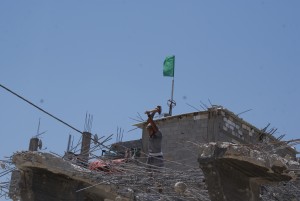Staging the family
How can you tell a dysfunctional family? Their home has no common gathering point or, where it does, they rarely congregate there at the same time.
As emotional gaps grow wider, self-imposed barriers grow thicker until they almost take on a physical form, like erecting an iron curtain across heart and mind. Although they continue to live in close proximity, they in fact occupy completely different planes of consciousness.
All the members of the family dwell in the cocoon of their own concerns to the exclusion of the rest and insulate themselves against the potentially harsh scrutiny of the family.
The Temple Theatre Company recently explored the mechanics of a dysfunctional family in the absurdist tragicomedy Life is Beautiful or Waiting for my Uncle from America at the French Cultural Centre and the Howard Theatre (AUC). While the theme has been covered umpteen times before, this production has an interesting blend of clichés and stereotypes.
The set and lighting, to their credit, utilise low-tech, low-priced materials to good advantage. Temple, like most independent theatre troupes, suffers from underfunding. This makes lighting an especially problematic challenge.
It was decided that the best way to remedy this situation was for several independent troupes to organise workshops mediated by a couple of French designers familiar with Egyptian theatre.
The success of the workshop reflected on the quality of the lighting and set design in the play. The back of the main stage area is divided into three curtained-off partitions with the front of the stage occupied by a single chair.
All around the audience there is a running wire fence that represents the walls of the apartment – the familial prison. The staging, set within the small dimensions of the Howard Theatre, evokes an unsettling sensation of confinement and mounting tension. The close proximity of the set – which the director, Ahmed el-Attar, manipulates to disturbing effect – is something the Cairiene audience could easily relate to.
The bleak tone is established before a single word is uttered. The curtains, dimly illuminated from behind, engage the audience's imagination in fascinated speculation. The blinking tints of a post-reception blizzard on a TV set behind the first curtain set the time as late night.
You can tell something is awry and not quite human about this household as soon as the maid walks on and starts to clean up with a clinical, robot-like precision and detachment from her task.
Next comes the unveiling of the rooms at the back, muting further speculation, to reveal three rooms (or display cabinets). First, are the rooms on the outsides: one is the youngest son's – the spoilt, idle brat – bedroom, with a mountain of junk beside the bed.
Second, is the toilet where the older son sits rather irreverently, with his trousers around his ankles, surrounded by newspaper. He dwells in a neurotic state of anxiety and disillusionment at the state of the world that he gleans from the clippings he collects sporadically from the papers around his feet.
In the middle room lies the bedridden, inert and accommodating mother. Her bedroom is a caricature of a hospital room, with several intravenous bags of blood hanging over her bed.
Pressure and claustrophobia are built up through a repetitive sequence of actions. The spoilt younger son demands new jeans, a mobile phone, luxurious meals. The older son rants to himself, often incomprehensibly, in the bathroom about the current state of affairs.
The father comes home every night to deliver a long, typical, fatherly monologue – the way he ignores his family and circumstances are manifestations of the denial in which he lives. While the mother meekly and weakly agrees to everything the father says and impotently resists her younger son's requests.
This is interspersed by regular calls from the long-awaited uncle who is supposed to arrive from America soon. The actors use the stage to create the sensation of the invisible, but very real barriers that stand between them and make them almost unaware of anything but their own particular wants.
The utilisation of space, light and movement in the production were indicative of a willingness to experiment with sound and space. As the packed houses night after night attested, audiences are crying out for good, mature theatre and I only hope that this will be the first of many experiments by this and other troupes to push the limits of the acceptable and tedious to offer us lively and vibrant theatre.
________
This article first appeared in Medina in September 2000.


